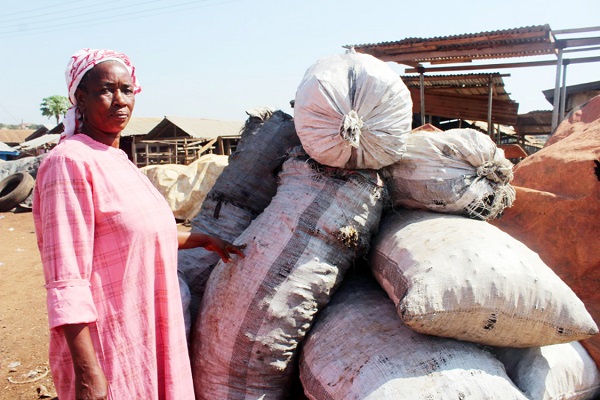
Mrs Mariyah Yahaya, a charcoal seller at the Nana Bosoma Market in Sunyani
The Ministry of Lands and Natural Resources is considering a ban on the export of charcoal as the commodity has been identified as a major driver of deforestation and forest degradation, the sector minister, Mr Samuel Abu Jinapor, has hinted.
“I am told that there is a huge market relating to the export of charcoal out of our country and the ministry is examining the issue,” he stated, adding that “charcoal is a raw material for the pharmaceutical industry of the world”.
Mr Jinapor, who was answering questions from journalists in Sunyani last Monday during his visit to the Bono Region as part of his tour of the country, explained that there was an upsurge in the export of charcoal and that could be attributed to the fact that the commodity was a raw material for the production of toothpaste and other commodities.
“We are looking at the issue and when we come to a conclusion and we are satisfied that the export of charcoal is a major driver to deforestation and forest degradation in our country, we will ban it with the approval of the President,” he stated.
Energy Commission
A write-up on the website of the Energy Commission headlined: “Woodfuel use in Ghana: Social, economic and energy dimensions,” indicates that 34.1 per cent of Ghana’s cooking fuel is from charcoal, while 33.3 per cent is from firewood and 24.5 per cent from Liquefied Petroleum Gas (LPG).
According to the article published on August 20, 2021, the demand for charcoal in Ghana is still rising with its production mainly taking place through logging of hardwood tree species from natural forests in the transitional and savannah zones.
That, according to the article, led to a high deforestation and forest degradation in these zones due to unsustainable and unregulated practices and the inefficient production of charcoal using mainly traditional earth mound kilns.
To support the implementation of a sustainable and efficient wood energy value chain, the Energy Commission, according to the article, was supporting the promotion of efficient charcoal kilns and the establishment of woodlots for the production of charcoal.
Figures on the website of the commission indicated that from January 2020 to July 2021, a total of 7,340 tonnes of charcoal were exported by nine companies to Europe, Middle East and Asia.
Views
Speaking to the Daily Graphic, a 56-year-old charcoal seller in Sunyani, Mrs Mariyah Yahya, said the government’s intention to ban the export of charcoal was good, even though it might not be favourable to all players in the industry.
“Even though I am in the charcoal business, the destruction caused by charcoal burners is not the best, since it has a negative effect on the environment,” she said.
Mrs Yahya explained that charcoal produced from dawadawa and shea butter trees, both economic trees, were high in quality.
However, a 38-year-old charcoal burner, Mr Adams Mohammed, said the ban on the export of charcoal would not be a good decision, explaining that Ghanaians alone could not use the amount of charcoal produced in Ghana.
He rather advised the government to put measures in place to prevent irresponsible charcoal burning, adding that as a school dropout, he was relying solely on the charcoal business to take care of his family, including his parents.
Mr Adams was of the opinion that the destruction of forest reserves by charcoal burners in the northern and middle belts of the country was unacceptable.
Measures
Outlining measures that had been adopted to protect the forest cover of the country during his visit, Mr Jinapor said a robust and comprehensive afforestation and reforestation programme had been embarked upon to ensure a green Ghana.
“While ensuring that we are protecting the forest cover, we have also embarked on these programmes to put in place new plantations and rehabilitate our depleted forests,” he said.
He added that after meeting members of the Bono Regional Security Committee, “We have resolved to come out with a strategy to ensure that forest reserves in the region are protected.
“Mercifully and thankfully, illegal mining is not so endemic in this region, but it also poses a challenge and a threat, which is that inasmuch as we are happy that the canker of galamsey is not endemic here, we ought to put in place preventive measures so that the situation does not arise,” he said.
Mr Jinapor, however, warned those engaged in pockets of illegal mining and illegal logging in the region to put a stop to the practice since the security services were ready to bring them to book as had been done in other regions.
House of Chiefs
He commended the Bono Regional House of Chiefs for its plan to plant trees at the banks of all rivers and water bodies and pledged that the ministry would assist them with both technical and financial support when the programme began.
For his part, the Vice-President of the Bono Regional House of Chief, Okokyeredom Sakyi Ako, called on the government to resource the Land Use and Spatial Planning Agency (LUSPA) to enable it to be up to its responsibility of ensuring proper land use in the country.



